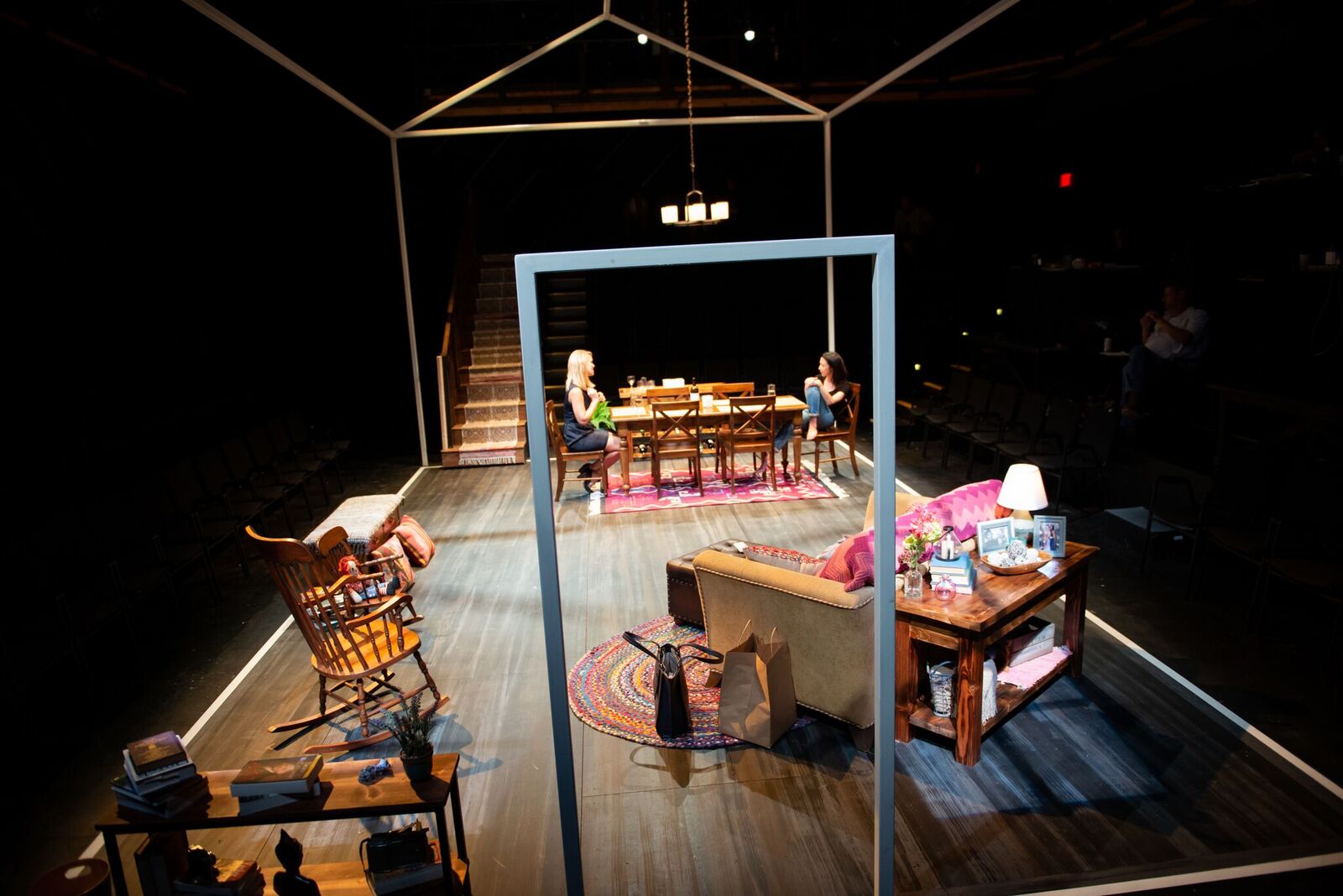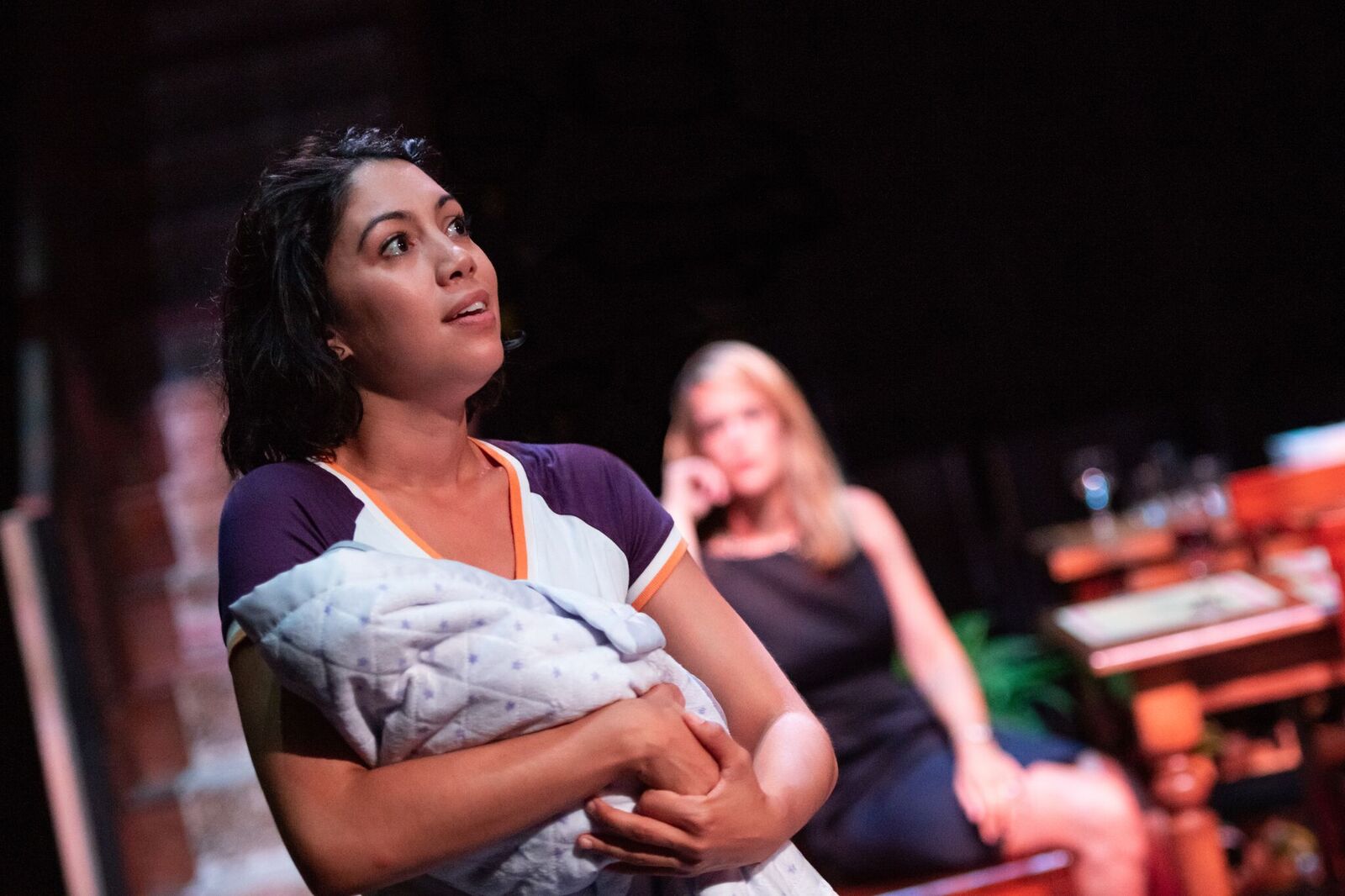Aficionados of ancient tragedy will tell you that the main difference between the Romans and the Greeks was that the Romans –Seneca, especially—loved their violence served up downstage center, the gorier the better, while the Greeks preferred their murders committed discreetly offstage and then reported onstage.

I mention this historical tidbit because one of the fascinating features of this year’s Contemporary American Theatre Festival (running throughout the month of July in nearby Shepherdstown, West Virginia) is that the Marinoff theatre, CATF’s in-the-round theatre space, features two contrasting tragedies that follow this formula.
Thanks to “the magic of theatre” (translation: a team of highly-trained stage hands working their tails off) you can witness the messy, apocalyptic on-stage violence of C. A. Johnson’s Thirst and return just a few hours later to the same space to discover an immaculate, modern American home. Not a speck of dust, let alone blood, to be seen. A sign that although there will be violence, it will not be physically present, rather it will linger as an overwhelming psychic force.
I hope you don’t mind if I linger for a moment over the set design here. Designers, like actors, long to be known for their versatility, and it’s wonderful to see both artistic camps showing off their chops in such a generous space. Set Designer Jesse Dreikosen has created two environments for plays that could not be more different. It’s as if you went to a gallery for an artist’s showing, went off for lunch, and then returned to find the entire joint completely rebuilt from scratch, by the same artist, but with a completely different aesthetic.
So now back to the play at hand, and the amazing acting. Amy E. Witting’s The House on the Hill begins with a woman wrapping up her latest yoga session (accompanied by the usual soothing music track, thanks to Sound Designer Elishiba Ittoop). All is calm, and Dreikosen’s evocation of a geometrically perfect, harmonious house creates the false impression of a life in balance. Over the course of the play, we begin to understand that houses are often not just to live in. They are a place to reflect on times and loved ones past, and more importantly a space to rebuild one’s own psyche from the ground up.
The woman in question, Alexandra (the quietly powerful Joey Parsons), seems at ease in her own home, living alone, and not much in need of company. Her pleasant solitude is shattered by the sudden appearance of Frankie (Jessica Savage, in a truly compelling turn). The two are cousins and in their youth were close friends, until a horrific act of violence tore their relationship, and both their lives, apart.
Witting isn’t content to have two mature women air out their dirty laundry—one of the most dreaded stereotypes of modern drama is the spectacle of two characters putting cigarettes out in each other’s eyes. Instead, to show what was lost, and to reinforce the ways in which memory can deepen the trauma and resentments of a lifetime, she weaves the adult Alexandra with her younger self, Alex (the charming Sam Morales) and the adult and Young Frankie (Ruby Rakos, equally astute in her evocation of adolescence).

The tapestry that results is one in which past and present collide, with older Alexandra and Frankie re-living key moments, or simply remembering them, and reminding each other of the ways in which their lives will forever be linked to one horrific moment.
Parsons also performs in Memoirs of a Forgotten Man on the Frank Center stage, in roles (as psychotherapist and busybody-spy) that are a marked contrast to the volcano that is Alexandra. It is Alexandra’s suffering that slowly comes into focus, and as the full impact of her tragedy comes into view we understand her need for the remote mountain home of the title, and for extra rooms she knows will never be occupied. Parsons’ slow burn as Alexandra tries to control her fury at Frankie’s intrusion into her sanctum sanctorum, is as unsettling as it is unforgettable, and her final explosion is as cathartic for us as it is for her.
To appreciate Savage’s work, it helps to plan on seeing both Thirst and House, back-to-back if you dare. Because in Thirst she plays the cocky, self-assured Gretta, fierce and unswerving in her devotion to her newly-found family. Her turn in The House on the Hill couldn’t be more different.
Frankie arrives at Alexandra’s house a complete emotional wreck, with a newborn in her arms, a profound self-loathing, and a lifetime of regrets. As she makes quick use of Alexandra’s liquor cabinet, it becomes clear that the violent event which tore their friendship apart has left her deeply wounded, in ways that we cannot begin to imagine.
What is remarkable about The House on the Hill is the way in which Witting forces us to find sympathy for both characters, and to realize that our traditional focus on direct victims of violence, while sincere, is woefully incomplete. The others whom we marginalize, the bystanders, family of the guilty, are as much in need for closure as anyone else.
Director Ed Herendeen has created a finely-crafted hour and a half of intense theatre, complete with overlapping lines, intricately-staged entrances and exits, and a keen sense of how to leaven the darkness at the heart of the play with moments of humor and touching humanity. Tragedies can be a rough ride, and this one has more than its share of bumps, but he lands us gently, if roughly, with an ending that marks a new beginning.
Running Time: 90 minutes, with no intermission.
The House on the Hill runs through July 29, 2018, at the Marinoff Theater at Shepherd University – 62 W Campus Drive, in Shepherdstown, West Virginia. For tickets call 800-999-CATF (2283) or 304-876-3473, or purchase them online.




